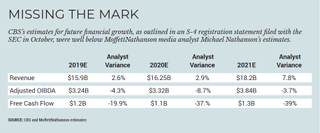Pre-Wedding Jitters Over ViacomCBS
CBS and Viacom, less than a month away from completing their long-awaited re-merger, have given analysts and investors plenty to worry about, even as they tout their deal as creating a $28 billion media power poised to ride the wave of streaming video.
ViacomCBS will possess a massive library (140,000 TV episodes, 3,600 movie titles); strong direct-to-consumer businesses in CBS All Access, Showtime and Pluto TV; film production; and broadcasting, after closing sometime by early December.

Analysts following both companies have been skeptical of the combination, and over the past few weeks the basis for those fears has been evident. Since announcing the intent to merge on Aug. 13, Viacom stock is down 23.1% and CBS shares have fallen 22.7%.
Worries, especially on the CBS side, surfaced in late October, after the broadcaster filed its S-4 registration statement and revealed financial estimates for the combined company that in some cases were well below analysts’ projections. That resulted in several downgrades for the stock, and a nearly 4% decline in both Viacom and CBS shares between Oct. 16 and 18.
Reaction from analysts about the S-4 ranged from the outraged, with MoffettNathanson media analyst Michael Nathanson calling it an “abject disaster;” to cautious, with Bank of America Merrill Lynch’s Jessica Reif Ehrlich focusing on revenue growth. Ehrlich said in a research note that while content investment was heavier than expected, “we believe healthy top-line trends remain visible.”
Revenue Skeptical
Sanford Bernstein media analyst Todd Juenger, a longtime critic of the Viacom-CBS merger, disagreed with CBS management’s focus on revenue growth, the idea being as content costs fell and revenue grew over time, cash flow growth would rise. He believes the company will need to continually invest in content just to compete.
Multichannel Newsletter
The smarter way to stay on top of the multichannel video marketplace. Sign up below.
“We think the competitive environment is only going to get tougher, not easier,” Juenger wrote at the time.
CBS didn’t do much to alleviate those fears when it reported Q3 results on Nov. 12. Revenue was up 1% to $3.3 billion, and cash flow was $27 million in the period (down from $137 million in the prior year), mainly due to increased content investment.
That spending continues. CBS confirmed reports that it purchased rights for soccer’s UEFA Champions League, along with Univision Communications on the Spanish-language side, beginning in 2021. Terms of the deal were not disclosed, but reports put the price tag of the rights at around $150 million per year. According to CBS, it will get the rights to air about 400 Champions League matches, most of which will air live on the CBS All Access streaming service.
CBS acting CEO Joe Ianniello said on an earnings conference call that the Champions League pact was in line with the strategy to buy and create compelling content, though Juenger wondered why Fox, a major player in live sports rights, decided to pass this time out. Either way, CBS appears to be doubling down on its programming commitment.
Unimpressed by Spending
That is usually good news, as most streaming services talk constantly about their robust original programming budgets. The news was not so good for CBS, though. Nathanson noted that, given the trading multiples of the stocks (CBS at 7.5 times 2020 cash flow, Viacom at 5.8 times), “the market has voted that there is no end in sight to the investment spending at CBS.”
Nathanson again pointed to the S-4, which he said hasn’t done much to change the “bear narrative that margins and free cash flow are in structural decline.” Still, he was hopeful that once the merger is finished, investors will get more clarity and action around several questions, including if synergies will increase, if content spending will be scaled back, if non-core assets might be sold or if stock might be bought back.
“Big picture, if these elevated spending levels are not generating the necessary returns as CBS and Showtime margins are eroding, when will the decision be made to shift the strategy back to a full arms dealer of content to third parties?” Nathanson wrote.

Viacom’s fiscal Q4 results, released on Nov. 14, didn’t help the situation. Full-year free cash flow missed its estimates by almost $100 million, at $1.75 billion versus the earlier estimate of $1.83 billion. Revenue also was down 2% to $12.8 billion, while adjusted OIBDA rose 2% to $2.9 billion.
“If Viacom can't predict one quarter in FY19, why would anyone believe their S-4 predictions for FY20 and beyond?” Juenger wrote.
